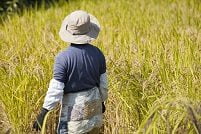

Features
Feeding the world: the crisis, risks and opportunities.
The Food and Agriculture organisation estimates that $83 billion per annum needs to be spent over the next 30 to 40 years in order to actually meet the population’s food requirements by 2050. But the need for solutions that are both sustainable and ethical is increasingly required. We ask Ecclesiastical Investment Management how they see the future of investing in such solutions and why it’s critical.
The social consequences of rising wheat, oil and dairy prices, which are set to increase between 15% and 45% over the next decade, puts food security along with climate change and genetically modified (GM) crop technology high on the agenda of challenges facing food production. With food output needing to increase by 70% in order to feed a growing population, there is also an ongoing imbalance in demand and supply.
From an investment perspective, Ecclesiastical Investment Management identifies mechanisation, fertilisers, crop protection, plants, seeds and livestock and aquaculture, which refers to fishing, as key themes underpinning food production issues.
Read more on Blue & Green Investor


 Environment11 months ago
Environment11 months agoAre Polymer Banknotes: an Eco-Friendly Trend or a Groundswell?

 Features10 months ago
Features10 months agoEco-Friendly Cryptocurrencies: Sustainable Investment Choices

 Features11 months ago
Features11 months agoEco-Friendly Crypto Traders Must Find the Right Exchange

 Energy10 months ago
Energy10 months agoThe Growing Role of Solar Panels in Ireland’s Energy Future





























